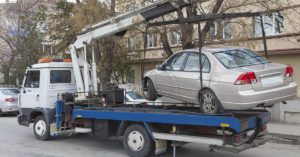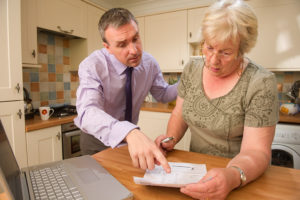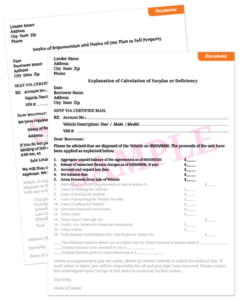You don’t park your car in front of your house anymore.
It’s been a few months since you were able to make a payment and you’re worried about repo men showing up in the middle of the night.
What you didn’t anticipate is the repossession firm showing up where you work. Suddenly, you have no car, no way to get back home, no way to get anywhere.
This can be a devastating situation, but it’s not a hopeless one. Even though your car has been repossessed, it doesn’t mean you can’t get it back.
Was your vehicle wrongfully repossessed?
 Auto lenders can repossess vehicles if the borrower defaults on the loan. However, consumer laws protect borrowers from tactics used by the lender or repossession agent in the process of taking a vehicle. While the repossession company must inform local police of an impending repossession, the repo agent can’t:
Auto lenders can repossess vehicles if the borrower defaults on the loan. However, consumer laws protect borrowers from tactics used by the lender or repossession agent in the process of taking a vehicle. While the repossession company must inform local police of an impending repossession, the repo agent can’t:
- Enter a closed garage or trespass on your property
- Come into your home unless they’ve been invited
- Damage your car during repossession
- Cause physical harm to you
- Threaten you with violence or arrest
- Make you pull over while driving
- Have law enforcement assist
If your vehicle has been taken, contact a qualified a car repossession lawyer for review of the sequence of events. An evaluation of the consumer protection laws will determine whether the lender wrongfully repossessed your vehicle and if you have a case to pursue against the lender.
How to get your car back?
Look at your loan agreement
 Your signed loan agreement, or Retail Installment Sales Contract, states terms if your vehicle is repossessed. Some loan agreements allow the borrower to reinstate the loan by paying past due payments, while others demand a full payoff of the loan. Check your agreement to see the terms that were agreed upon for your loan.
Your signed loan agreement, or Retail Installment Sales Contract, states terms if your vehicle is repossessed. Some loan agreements allow the borrower to reinstate the loan by paying past due payments, while others demand a full payoff of the loan. Check your agreement to see the terms that were agreed upon for your loan.
Review documents sent by the lender
 After your vehicle has been repossessed, the lender, bank, or credit union is required to provide you with a letter which confirms the repossession and states terms for you to get it back. This notice, frequently called a Notice of Intent to Sell Property, explains how much money is owed, where your car is, and how much time you have to meet the terms before the car will be sold at a private sale or auction.
After your vehicle has been repossessed, the lender, bank, or credit union is required to provide you with a letter which confirms the repossession and states terms for you to get it back. This notice, frequently called a Notice of Intent to Sell Property, explains how much money is owed, where your car is, and how much time you have to meet the terms before the car will be sold at a private sale or auction.
After the vehicle is sold, the lender will send a Deficiency Letter to the borrower confirming the selling price of the car and any remaining balance owed on the loan, or surplus due the borrower.
Retrieve your personal belongings
The repo company or lender don’t have any claim to your personal belongings left in the car at the time of the repossession. You have 30 days to retrieve your belongings from the repo lot. After this period, the repo agent will dispose of these items.
Gather these documents for a legal review
1. Loan Agreement or Retail Installment Sales Contract
If you financed your car through an auto dealer, your loan agreement, or Retail Installment Sales Contract (RISC), details what will happen if you default on your loan. Keep this and other car purchase documents in a safe place (in other words, not in your car).
But if you have left your loan agreement in the car, you can either contact your lender or the car dealership to retrieve this paperwork or visit the repo lot to get back the agreement and any other personal items you left in your vehicle.
2. Repossession Notice or Notice of Intent to Sell Property
Under the law, your lender doesn’t have to notify you in advance of the repossession. But they do need to send you a repossession notice once the vehicle has been taken. This notice contains the most important piece of information about your car repossession: how to get it back.
The letter will tell you how much you’ll need to pay to get your car back. This amount might be the full balance of your loan, or just the past due payments. You should receive this letter within enough time to make arrangements to recover the car before it’s sold or auctioned off.
3. Deficiency Notice
After the car has been sold, the lender will send you a letter known as a Deficiency Notice which lets you know the sale price, any repossession and storage fees, and the calculation of the remaining balance owed on the loan. As well, if there’s a surplus from the sale, the letter will tell you the amount owed to you by the lender if the sale price was more than the full loan balance.
If your rights have been violated during repossession, or if your bank or the repossession agent overlooked the laws protecting borrowers, you may be able to take legal action.
Seek Legal Assistance
 The attorneys at Flitter Milz can help. Our consumer protection lawyers will review your case and determine whether the finance company and/or repossession agent acted within the bounds of the law and if you can take legal action.
The attorneys at Flitter Milz can help. Our consumer protection lawyers will review your case and determine whether the finance company and/or repossession agent acted within the bounds of the law and if you can take legal action.
If your car, truck, boat, motorcycle or recreational vehicle – has been repossessed, contact us today for a free consultation.






